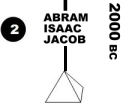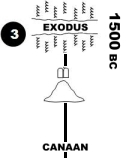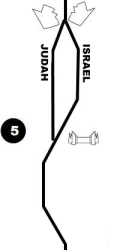![]() Click here for a printable version.
Click here for a printable version.
The Bible is one of the most well known books in the world. Publishers have sold more Bibles than any other book. It might be that one has not read it or does not believe it, but nearly every person has at least one copy of the Bible in his home.
Everyone knows something about the Bible. Perhaps he knows the story of Adam and Eve, of Noah and the flood, of Moses and the 10 commandments, or of Jesus and the cross.
However, while the Bible is well known by the world, at the same time, it is not known well by many. In reality, few know the message of the Bible
Many who call themselves “Christians” cannot put many of the major events of the Biblical story in order or may not even be able to remember all the books of the Old or New Testament.
For this reason, it is critical that we take some time to understand the overall story of the Bible.
The Old Testament

 In the beginning, God created the heavens and the earth and put man in this creation (Genesis 1:1, 27). The earth was “very good” (1:31).
In the beginning, God created the heavens and the earth and put man in this creation (Genesis 1:1, 27). The earth was “very good” (1:31).
But everything changed with the sin of man (3:6). Man was thrown out of the Garden of Eden, far from the tree of life. Adam and Eve began to die physically and spiritually. With Adam and Eve began the problem of sin.
However, God had a plan. In Genesis 3:15, while cursing the serpent for his part in the rebellion, God predicted a war between the serpent (Satan) and the seed of woman: “He shall bruise you on the head, and you shall bruise him on the heel.” In this battle, the seed of woman would be wounded, but Satan would be given the fatal blow.
Essentially, in the first three chapters, we have the entire Bible story: man and his problem with sin, and God and his salvation brought about by the seed.
But who was this seed? How was God going to fulfill his promise of hope? This is the rest of the story.
After the first sin, the problem only got worse. Each man chose to sin – even to the point that “every intent of the thoughts [of man]…was only evil continually” (6:5). Only the family of Noah found favor in the eyes of God (6:8). God saved Noah from the wickedness of men by a world-wide flood (6:7).

 Through Noah and his sons the earth was repopulated, and through the coming generations (literally, his seed) arrived a man of faith, Abraham. To Abraham, God gave three promises (12:1-3):
Through Noah and his sons the earth was repopulated, and through the coming generations (literally, his seed) arrived a man of faith, Abraham. To Abraham, God gave three promises (12:1-3):
|
– Canaan – The seed |
These promises were not just given to Abraham (22:17-18), but also repeatedly to his sons, Isaac (26:4) and Jacob (28:3-4, 13-14).
In the course of events, Jacob (Israel) had twelve sons. To each one, Jacob gave promises as well. The promise of Judah is especially interesting (49:10). Using the language of the seed promise, Jacob said, “The scepter shall not depart from Judah…until Shiloh comes.” The kings of the nation of Israel were to come from children of Judah.

 The children of Jacob were carried to Egypt and made slaves by Pharaoh. But God blessed them. Four hundred years later, at the beginning of the book of Exodus, the children of Israel had grown to be a great nation. God raised up a man, Moses, to save the people through 10 plagues. In the end, all of Israel crossed the Red Sea, and God guided them to Mount Sinai to receive the law and covenant with God.
The children of Jacob were carried to Egypt and made slaves by Pharaoh. But God blessed them. Four hundred years later, at the beginning of the book of Exodus, the children of Israel had grown to be a great nation. God raised up a man, Moses, to save the people through 10 plagues. In the end, all of Israel crossed the Red Sea, and God guided them to Mount Sinai to receive the law and covenant with God.
Even during this time, God was thinking about his promise to man. Still at the foot of Sinai, in Leviticus 26:40-42, God affirmed he would remember the promise he made with Abraham, conditioned on the obedience of the people.
After Sinai, the Israelites passed forty years through the desert and arrived at the Promised Land, Canaan (Numbers and Deuteronomy). Under the direction of Joshua, they conquered the peoples in the land. The Israelites lived many years in Canaan, governed by God and his judges.

 However, the people were not content with the judges. Wanting to be like the other nations, they asked for a king. Saul was the first king, but he was not obedient to God, and so Jehovah replaced him with David, a king after God’s own heart.
However, the people were not content with the judges. Wanting to be like the other nations, they asked for a king. Saul was the first king, but he was not obedient to God, and so Jehovah replaced him with David, a king after God’s own heart.
During the reign of David, more or less five hundred years after the exit of Egypt, God gave David the seed promise (2 Samuel 7:12-13). He promised a son who would build a temple and would have power forever. David’s son Solomon did build a physical temple in Jerusalem during his reign. But this prophecy had a broader view than just the life of Solomon.

 The story of God’s people after Solomon is tumultuous. During the reign of his son Rehoboam, a division occurred between the twelve tribes: ten tribes to the north (Israel) and two tribes to the south (Judah). All of the kings of the northern kingdom were evil, not giving attention to the laws of God and serving the idols of the nations. So, God punished Israel, sending them to captivity in Assyria. The kings of the south were a little better. For a longer period of time, they retained their relationship with Jehovah. They worshipped in his temple in Jerusalem, but in the end, they sought after other gods, and Judah was carried away into Babylonian captivity.
The story of God’s people after Solomon is tumultuous. During the reign of his son Rehoboam, a division occurred between the twelve tribes: ten tribes to the north (Israel) and two tribes to the south (Judah). All of the kings of the northern kingdom were evil, not giving attention to the laws of God and serving the idols of the nations. So, God punished Israel, sending them to captivity in Assyria. The kings of the south were a little better. For a longer period of time, they retained their relationship with Jehovah. They worshipped in his temple in Jerusalem, but in the end, they sought after other gods, and Judah was carried away into Babylonian captivity.
Even in this dark time for Israel, with the physical temple destroyed and God’s nation carried into a foreign land, Jehovah remembered his promise to Abraham. Through the prophet Jeremiah, God told of a “Branch” that would reign justly and would save his people (23:5-6).

 After many years of captivity, God permitted a portion of the Jews to return to their land. They rebuilt Jerusalem and the temple, but never attained the former glory of Israel. During this time God gave hope to Israel through the prophet Zechariah. Again, a “Branch” would govern as king and priest and rebuild the temple (6:12-13), this while the Israelites were currently rebuilding the physical temple.
After many years of captivity, God permitted a portion of the Jews to return to their land. They rebuilt Jerusalem and the temple, but never attained the former glory of Israel. During this time God gave hope to Israel through the prophet Zechariah. Again, a “Branch” would govern as king and priest and rebuild the temple (6:12-13), this while the Israelites were currently rebuilding the physical temple.
And so the Old Testament ends: the mystery of the seed promise, the promised king, and the new temple still unresolved for the Jews. This mystery is not revealed until four hundred years later…
The New Testament
 Matthew 1:1-17 – The first book of New Testament, Matthew, opens with a list of men, the ancestors of Jesus. The purpose of this list is also the purpose of the book of Matthew: to show Jesus as descendant of Abraham and David. Jesus is the promised king and the fulfillment of the promise to Abraham (1:1).
Matthew 1:1-17 – The first book of New Testament, Matthew, opens with a list of men, the ancestors of Jesus. The purpose of this list is also the purpose of the book of Matthew: to show Jesus as descendant of Abraham and David. Jesus is the promised king and the fulfillment of the promise to Abraham (1:1).
Luke 3:23-38 – Another gospel, Luke, also has a list of genealogy. This list does not merely trace Jesus’ lineage back to David or Abraham. This list goes back to the very beginning and reminds us of the promise first given to Adam and Eve; the seed of woman promised inGenesis 3:15 has come. The message of Luke is that Jesus has come as Savior of all – not just the Jews.
Galatians 3:16-17, 26-29 – The apostle Paul speaks in Galatians about the fact that salvation is not just for Jews only; it is also available to the Gentiles (everybody else). Christ comes as fulfillment of the promise of Abraham; Christ is the promised seed. Although we might not be sons of Abraham physically, we can be heirs of the blessings that God promises to all the families and nations of the earth (Genesis 12:3). See also Romans 4:16-18.
Ephesians 3:3-6 – In his letter to the Ephesians, Paul speaks again about the opportunity for the Gentiles to be citizens of the kingdom of God without being Jews. This fulfills the promises of the Old Testament, a message that was a mystery to the Jews. Now, with new revelation through the apostles, we can understand this mystery.
Hebrews 2:14-16 – The writer of Hebrews says that finally, through the death of Jesus Christ, God cancels out the power of the devil, the power of death. In the cross, the serpent receives his fatal wound (Genesis 3:15) and all men are given opportunity to be freed from the power of sin and death.
The message of the Bible
Simply put the message of the Bible is Christ.
- The Old Testament – Christ is coming.
- The Gospels – Christ is here.
- The Epistles – Christ is coming again.
